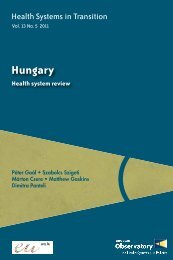Canada - World Health Organization Regional Office for Europe
Canada - World Health Organization Regional Office for Europe
Canada - World Health Organization Regional Office for Europe
Create successful ePaper yourself
Turn your PDF publications into a flip-book with our unique Google optimized e-Paper software.
72<br />
<strong>Health</strong> systems in transition <strong>Canada</strong><br />
3.3.2 Collection<br />
The dominant sources of funding are the general revenue funds of F/P/T<br />
governments. The bulk of provincial revenues is derived from individual<br />
income taxes, consumption taxes, corporation taxes and, at least in the case of<br />
resource-rich jurisdictions, resource royalties or taxes.<br />
These general tax revenues are supplemented by health premiums in three<br />
provinces. In British Columbia, health premiums come in the <strong>for</strong>m of a poll<br />
tax on individuals ($64 per year in 2012) and families ($116 <strong>for</strong> a family of two<br />
and $121 <strong>for</strong> a family of three or more in 2012), while in Ontario and Quebec<br />
they take the <strong>for</strong>m of a surtax that is collected through a progressive income<br />
tax system. 1<br />
In both cases, premiums are only notionally earmarked <strong>for</strong> health spending<br />
and in fact flow into the general revenue funds of the provincial governments<br />
and thus are treated as part of general taxation. It should also be noted that<br />
health services cannot be denied on the basis of non-payment of premiums,<br />
and the provinces must rely on other remedies to en<strong>for</strong>ce their collection.<br />
<strong>Health</strong> premiums raise less than 20% of what is expended by the provincial<br />
governments on health each year (McDonnell & McDonnell, 2005). A health<br />
premium in Alberta was eliminated in 2009, after a Task Force on <strong>Health</strong><br />
Care Funding and Revenue Generation concluded that the premiums collected<br />
amounted to less than 13% of provincial health revenue needs (Alberta <strong>Health</strong><br />
and wellness, 2002).<br />
3.3.3 Pooling of funds and health system transfers<br />
Budgetary allocations <strong>for</strong> health expenditures are made at three main levels in<br />
<strong>Canada</strong>: (1) the federal government (2) the provincial and territorial governments<br />
and (3) RHAs. At the federal and provincial levels, budgetary allocations are<br />
decided in cabinet and then reviewed and passed in the respective legislative<br />
chambers.<br />
RHAs do not collect taxes but they allocate the funds they receive from<br />
ministries of health based on what they perceive to be the health demands of<br />
the populations they serve and the health care organizations and providers<br />
they fund. In the past, provincial RHA allocation <strong>for</strong>mulas were used as a tool<br />
of health system re<strong>for</strong>m – specifically to encourage more activity in upstream<br />
primary care and public health from downstream acute care. However, at least<br />
in most cases, these funding allocation <strong>for</strong>mulas do not appear to have achieved<br />
1 At the time of writing, the government of Quebec announced its intention to repeal its health surtax.
















